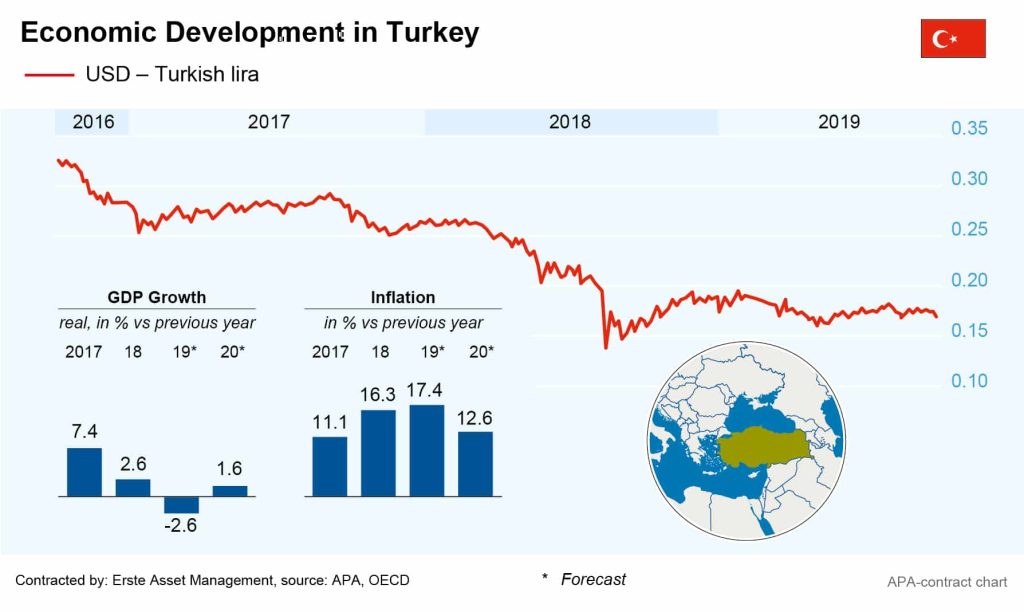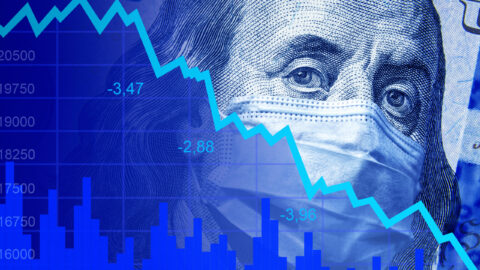
Recent economic data indicates that the Turkish economy is recovering to some extent. Most recently, the formerly very dynamic economy’s GDP has increased again, with inflation returning to single digits after a massive rise. The Turkish lira’s exchange rate was also largely stabilised after last year’s currency crisis. However, the Turkish invasion in northern Syria and the conflict surrounding it with the USA put the lira under renewed pressure, raising concerns about the Turkish economy’s recovery. There are varying signals regarding the further development.
Signs pointing to relaxation
Last year, a diplomatic dispute with the USA and doubts about the independence of the Turkish central bank had caused the country’s currency to decrease by almost a third. As a result of the sharp increase in import prices, inflation rose to almost 25 per cent in the meantime, and in the latter half of 2018, the Turkish economy finally slipped into recession.
Recently, there have been clearer signs again of the Turkish economy stabilising. Although the GDP remained negative year-on-year, the economic output increased for the second consecutive quarter between April and June of this year (+1.2 per cent). In September, inflation also fell to 9.3 per cent, sinking below double-digit levels for the first time since mid-2017. The positive outlook was also corroborated by further news: In September, Turkey stated that it intended to quadruple bilateral trade in goods with the USA to USD 100bn per year in response to the trade dispute with China. Meanwhile, the German Volkswagen Group announced that it would build its new Eastern European plant in Turkey. In addition, the Turkish central bank – following President Recep Tayyip Erdogan’s replacement of its Governor in the middle of the year – significantly lowered key interest rates for the second consecutive time. While this is expected to further boost the country’s economy, it also increases the risk of returning higher inflation rates.
Different expectations and challenges
According to President Erdogan, the Turkish economy is expected to grow again by 5.0 per cent in 2020. While economists surveyed by Reuters on the whole expect stagnation, the Organisation for Economic Cooperation and Development (OECD) expects real GDP to decline by 2.6 per cent in the current year and to increase slightly by 1.6 per cent in 2020.
The economic environment in Turkey remains challenging. Investors are not only focusing on monetary policy, which is no longer considered to be independent following the replacement of the central bank’s Governor, and, due to the geopolitical situation, international relations play a particularly decisive role. The Turkish government’s plans to procure Russian missile systems put a heavy damper on relations with the USA this year and could jeopardise plans for closer trade relations.

Note: Past performance is not indicative of future development.
Last week, the situation seemed to escalate again with Turkey’s advance against Kurdish militias in northern Syria. US President Donald Trump had previously cleared the way for the Turkish military operation there by withdrawing troops, but at the same time had threatened to “totally destroy Turkey’s economy” if Istanbul did something he considered wrong. As a result, the lira fell by a good 2 per cent, calling back to last year’s currency crisis, which already seemed to have been overcome.
Legal note:
Prognoses are no reliable indicator for future performance.
Legal disclaimer
This document is an advertisement. Unless indicated otherwise, source: Erste Asset Management GmbH. The language of communication of the sales offices is German and the languages of communication of the Management Company also include English.
The prospectus for UCITS funds (including any amendments) is prepared and published in accordance with the provisions of the InvFG 2011 as amended. Information for Investors pursuant to § 21 AIFMG is prepared for the alternative investment funds (AIF) administered by Erste Asset Management GmbH pursuant to the provisions of the AIFMG in conjunction with the InvFG 2011.
The currently valid versions of the prospectus, the Information for Investors pursuant to § 21 AIFMG, and the key information document can be found on the website www.erste-am.com under “Mandatory publications” and can be obtained free of charge by interested investors at the offices of the Management Company and at the offices of the depositary bank. The exact date of the most recent publication of the prospectus, the languages in which the fund prospectus or the Information for Investors pursuant to Art 21 AIFMG and the key information document are available, and any other locations where the documents can be obtained are indicated on the website www.erste-am.com. A summary of the investor rights is available in German and English on the website www.erste-am.com/investor-rights and can also be obtained from the Management Company.
The Management Company can decide to suspend the provisions it has taken for the sale of unit certificates in other countries in accordance with the regulatory requirements.
Note: You are about to purchase a product that may be difficult to understand. We recommend that you read the indicated fund documents before making an investment decision. In addition to the locations listed above, you can obtain these documents free of charge at the offices of the referring Sparkassen bank and the offices of Erste Bank der oesterreichischen Sparkassen AG. You can also access these documents electronically at www.erste-am.com.
Our analyses and conclusions are general in nature and do not take into account the individual characteristics of our investors in terms of earnings, taxation, experience and knowledge, investment objective, financial position, capacity for loss, and risk tolerance. Past performance is not a reliable indicator of the future performance of a fund.
Please note: Investments in securities entail risks in addition to the opportunities presented here. The value of units and their earnings can rise and fall. Changes in exchange rates can also have a positive or negative effect on the value of an investment. For this reason, you may receive less than your originally invested amount when you redeem your units. Persons who are interested in purchasing units in investment funds are advised to read the current fund prospectus(es) and the Information for Investors pursuant to § 21 AIFMG, especially the risk notices they contain, before making an investment decision. If the fund currency is different than the investor’s home currency, changes in the relevant exchange rate can positively or negatively influence the value of the investment and the amount of the costs associated with the fund in the home currency.
We are not permitted to directly or indirectly offer, sell, transfer, or deliver this financial product to natural or legal persons whose place of residence or domicile is located in a country where this is legally prohibited. In this case, we may not provide any product information, either.
Please consult the corresponding information in the fund prospectus and the Information for Investors pursuant to § 21 AIFMG for restrictions on the sale of the fund to American or Russian citizens.
It is expressly noted that this communication does not provide any investment recommendations, but only expresses our current market assessment. Thus, this communication is not a substitute for investment advice.
This document does not represent a sales activity of the Management Company and therefore may not be construed as an offer for the purchase or sale of financial or investment instruments.
Erste Asset Management GmbH is affiliated with the Erste Bank and austrian Sparkassen banks.
Please also read the “Information about us and our securities services” published by your bank.

